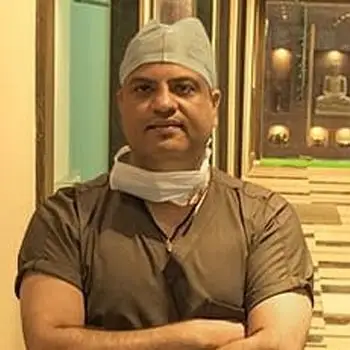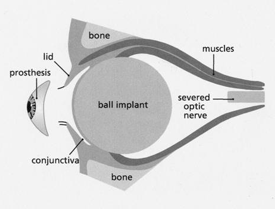ORBIT AND OCULOPLASTY Evisceration with ball implant Single Eye
India
-
Our Price USD 2159
-
Hospital Price USD 2273
-
You Save : USD 114
Booking Amount: USD 216. Pay Remaining 90% at the hospital.
Book NowAdditional Credit
Among the important extras we offer as part of the Additional Credit are the following:
-
Site Tourism For The Patient & Attendant
-
Airport Pick & Drop Service
-
Ambulance service at airport
-
Priority appointments with The Doctor
-
Cancel Easily Anytime with Full Refund
-
Room Upgradation
-
Free Online Doctor Consultation Valued at USD 20
-
Free hotel Stay for 5 to 7 days Accordingly
-
Welcome Kit at Arrival
-
Interpreter
-
Medical Visa Assistance
What is Included?
- Doctor consultation charges
- Lab tests and diagnostic charges
- Room charges inside hospital during the procedure
- Surgeon Fee
- Cost of implant
- Nursing charges
- Hospital surgery suite charges
- Anesthesia charges
- Routine medicines and routine consumables (bandages, dressings etc.)
- Food and Beverages inside hospital stay for patient and one attendant.
What is not Included?
- Extra Radiology Investigations
- Healthcare Professionals Charges of other consultations.
- Other Requested Services such as Laundry etc.
- Additional Pharmaceutical Products and Medicines After Discharge from Hospital.
- Management of Conditions Unrelated to Procedures or Pre-Existing.
- The cost of any additional implants will be in addition to the package cost.
Package Description
ORBIT AND OCULOPLASTY Evisceration with ball implant:
Evisceration is a surgical procedure that removes all intraocular contents while leaving the scleral shell, extraocular muscle attachments, and orbital adnexa intact. To maintain proper orbital volume, the procedure frequently includes the implantation of an implant into the evisceration cavity.
The contents of the eye are removed during an evisceration, leaving the scleral shell and extraocular muscles intact. The technique is often used to relieve discomfort or enhance cosmesis in a blind eye, such as in situations of antibiotic-resistant endophthalmitis.
Following Evisceration, orbital implants are medical prostheses that replace the orbital volume and allow some realistic movement of a prosthetic eye (or evisceration)
Disease Overview:
Painful blind eye and eye cancer
Eye cancer is a broad phrase that refers to a variety of cancers that may develop in various areas of the eye. It happens when healthy cells in or around the eye alter and grow out of control, resulting in a tumour. A tumour might be malignant or benign.
Disease Signs and Symptoms:
- In your eyesight, you may notice shadows, bursts of light, or wavy lines.
- eyesight is hazy
- a black spot in your eye that is enlarging
- Vision loss might be partial or total.
- One eye is drooping.
- swelling on your eyelid or in your eye that is getting bigger.
- Although uncommon, you may have pain in or around your eye.
Disease Causes:
Risk Factor
- Age is one of the possible risk factors for ocular melanoma. This variety is more prevalent in the elderly.
- Race. White people are more likely than black persons to get melanoma of the eye.
- The colour of your eyes and the tone of your skin.
- Moles.
- Cancer syndromes that are inherited.
- Some employees are exposed to ultraviolet (UV) radiation.
- The use of sunbeds is encouraged.
- Gender and age.
Disease Diagnosis:
A biopsy is the only means to achieve a definite cancer diagnosis for most forms of cancer. A diagnosis of ocular melanoma may often be obtained without a biopsy. To determine whether the cancer has spread, imaging tests may be done. Other tests that will aid in the diagnosis may be suggested by the doctor.
Disease Treatment:
A doctor must first establish the size of the tumour and if it has migrated to other areas of the eye, lymph nodes, or other parts of the body before treatment can begin. This is referred to as staging.
The doctor may also use a microscope to look at the cancer cells to see what type they are and how likely they are to react to therapy.
The doctor may advise cautious waiting if the tumour is tiny and slow-growing. If the tumour grows to a specific size or exhibits symptoms, treatment will begin.
Trusted Source may combine some of the following in a treatment plan:
The type and amount of surgery will be determined by the tumor's location and size. The quantity of tissue removed varies, ranging from a tiny piece of the eyeball to the entire eyeball (enucleation). Some or complete vision in the eye may be lost as a result of surgery.
Radiation treatment is accessible in a variety of forms. Doctors use a machine to deliver high-energy X-ray beams near to the malignancy, or they may inject a disc containing radioactive seeds directly into the eye (brachytherapy or plaque therapy). Because radiation can maintain eyesight and attractiveness, it is more commonly used than surgery.
Doctors employ infrared light to heat and destroy tumours via laser treatment. Because it can cause haemorrhage, retinal detachment, obstruction of ocular blood vessels, and recurrence of eye cancer, doctors mainly employ this procedure for minor eye malignancies.
Chemotherapy: Unless the disease has progressed to other regions of the body, chemotherapy is typically not the first choice of treatment for eye cancer.
Information related to Treatment
Package Details
Days in Hospital
1 Days
Days in Hotel
*
8 Days
Room Type
Private

Treating Doctor
Dr. Suraj Munjal
Ophthalmologist- Retina Surgeon, Cataract Surgeon, Lasik surgeon, Vitreo Retina Surgeon, Eyelid Surgery, Trabeculectomy, Vitreoretinal Surgery, Orbital & Oculoplastic surgery, Refractive surgery, Retina Examination, Glaucoma Evaluation / Treatment, Canaloplasty, Corneal Surgery, Eye Muscle Surgery, Orbital Surgery, Anterior Segment Surgery, Orbital Decompression Surgery for Thyroid Eye Disease, Orbital Trauma, Diabetic Retinopahy, YAG laser Posterior Capsulotomy, Anterior Retinal Cryotherapy, Retinal Surgery, Lens for Keratoconus
The Sight Avenue Eye Hospital Delhi, India
19 Years of Experience

Treating Doctor
Dr. Santosh G Honavar
Ophthalmologist- Eye Surgeon, Cataract Surgeon, Eyelid Surgery, Ocular Oncology, Orbital & Oculoplastic surgery, Oculoplasty, Eyelid Surgery, Orbital Surgery, Orbital Decompression Surgery for Thyroid Eye Disease, Orbital Trauma, Diabetic Retinopahy, Eye Patch Therapy
Center For Sight, Banjara Hills, Hyderabad Hyderabad, India
31 Years of Experience

Treating Doctor
Dr. Abdul Rasheed
Ophthalmologist- Cataract Surgeon, Lasik surgeon, SMILE Surgeon, Orbital & Oculoplastic surgery, Refractive surgery, Strabismus/Squint, Refractive surgery, Treatment for Keratoconus
Center For Sight, Kukatpally, Hyderabad Hyderabad, India
11 Years of Experience

Treating Doctor
Dr. P Vijay Anand Reddy
Oncologist,Ophthalmologist- Pap Smear, Stereotactic Radiosurgery (SRS), Stereotactic Body Radiation Therapy (SBRT), Intensity Modulated Radio Therapy (IMRT), Stereotactic Radio Therapy (SRT), Stereotactic Radiosurgery (SRS), Ocular Oncology, Stereotactic Body Radiation Therapy (SBRT), Image Guided Radiotherapy (IGRT), External Beam Radiation For Prostate Cancer, Medical oncology, Stereotactic Radiosurgery (SRS), Stereotactic Radiosurgery (SRS), Stereotactic Body Radiation Therapy (SBRT)
Center For Sight, Banjara Hills, Hyderabad Hyderabad, India
30 Years of Experience


